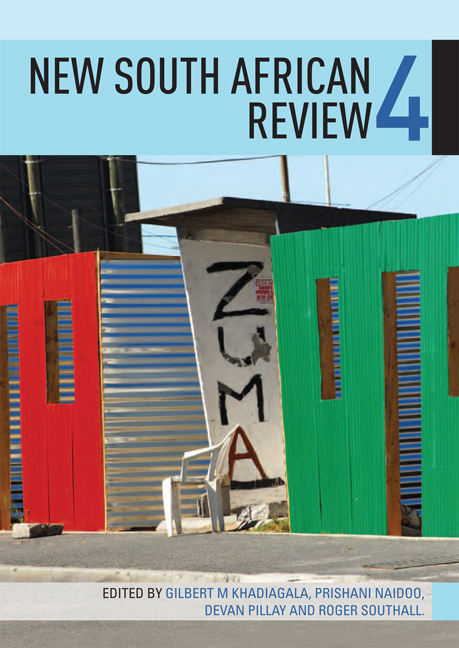Book contents
- Frontmatter
- Contents
- Preface
- Introduction: South Africa's fragile democracy: Twenty years on
- PART ONE ECOLOGY, ECONOMY AND LABOUR
- PART TWO POWER, POLITICS AND PARTICIPATION
- Introduction
- Chapter 6 Platinum, poverty and princes in post-apartheid South Africa: New laws, old repertoires
- Chapter 7 amaDiba moment: How civil courage confronted state and corporate collusion
- Chapter 8 Secrecy and power in South Africa
- Chapter 9 The contemporary relevance of Black Consciousness in South Africa
- Chapter 10 Death and the modern black lesbian
- PART THREE PUBLIC POLICY AND SOCIAL PRACTICE
- PART FOUR SOUTH AFRICA AT LARGE
- Contributors
- Index
Chapter 6 - Platinum, poverty and princes in post-apartheid South Africa: New laws, old repertoires
from PART TWO - POWER, POLITICS AND PARTICIPATION
Published online by Cambridge University Press: 21 April 2018
- Frontmatter
- Contents
- Preface
- Introduction: South Africa's fragile democracy: Twenty years on
- PART ONE ECOLOGY, ECONOMY AND LABOUR
- PART TWO POWER, POLITICS AND PARTICIPATION
- Introduction
- Chapter 6 Platinum, poverty and princes in post-apartheid South Africa: New laws, old repertoires
- Chapter 7 amaDiba moment: How civil courage confronted state and corporate collusion
- Chapter 8 Secrecy and power in South Africa
- Chapter 9 The contemporary relevance of Black Consciousness in South Africa
- Chapter 10 Death and the modern black lesbian
- PART THREE PUBLIC POLICY AND SOCIAL PRACTICE
- PART FOUR SOUTH AFRICA AT LARGE
- Contributors
- Index
Summary
INTRODUCTION
The Natives Land Act of 1913 delineated separate territories for black and white ownership and occupation of land, setting aside 7 per cent of the land for the black majority – subsequently increased to 13 per cent by the 1936 Natives Trust and Land Act. After the National Party came to power in 1948 it used the rural reserves established by the Land Acts as the basis for establishing ten ethnically defined ‘homelands’ for speakers of different African languages. Some of the ‘homelands’, such as Bophuthatswana, discussed here, became ‘independent states’. A feature of the anti-apartheid struggle of the 1980s was anti-Bantustan uprisings in ‘homelands’ such as Bophuthatswana, KwaNdebele, Lebowa and Ciskei. The Bantustans were re-incorporated into a unitary South Africa with the transition to democracy in 1994, and a system of elected local government was put in place throughout the country, replacing the system of chiefly rule over separate ‘tribes’ that had formed the bedrock of the Bantustan system. There has been concerted opposition, by lobbies representing traditional leaders, to their loss of power with the end of apartheid, and various laws bolstering the powers of traditional leaders have been enacted since 2003. Deposits of valuable minerals such as platinum, chrome, vanadium, titanium and coal have been discovered in former Bantustan areas, leading to a mining boom in recent years. South Africa's platinum belt spans the former Bantustans of Bophuthatswana and Lebowa and accounts for almost eighty per cent of the world's platinum production. Some of the most platinum-rich land in the western part of the bushveld was bought by groups of African purchasers either before the 1913 and 1936 Land Acts or through exemptions from them. These groups were subsumed within statedelineated ‘tribes’ during apartheid.
There are regular explosions of anger and frustration by local people in the platinum belt who are excluded from, and unable to get information about, the lucrative mining deals taking place on their mineral-rich land. These conditions gained national attention in 2012 with the massacre of thirty-four striking mineworkers at Marikana. Rural people living in former Bantustan areas continue to live in grinding poverty despite the valuable minerals in the land they have owned and occupied for generations. Instead, they read in the newspapers about mining companies and politically connected elites – in particular traditional leaders – flaunting vast amounts of money in opaque deals involving their land and mineral resources.
- Type
- Chapter
- Information
- New South African Review , pp. 113 - 135Publisher: Wits University PressPrint publication year: 2014



